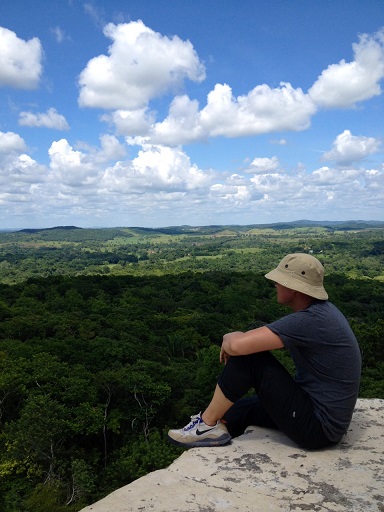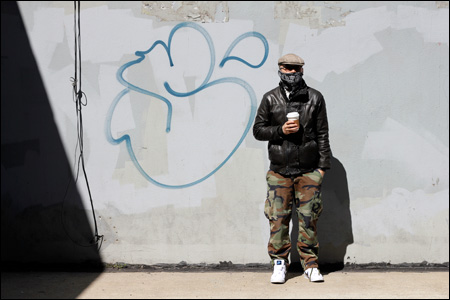To see Hyun Kim in person, one might think he seems to fit the part of the hip, well-styled and good-looking marketing industry insider. Follow him on Twitter and you see that he, appropriately so for his profession, has his finger on the pulse of all that is current. One could mistakenly make a judgment that, perhaps, Hyun is just another “industry” type who cares about all things material and trendy. But, if you do follow him on twitter, you will also quickly notice that he is not a self-promoter and that he can be critical about his chosen industry. Then, he publishes a piece on his personal website called “Never Want To Forget” and you realize that there is so much more to Hyun than what meets the eye. In fact, it was his piece “Never Want to Forget” that made me want to interview Hyun. The piece starts out, “I never want to forget the look on my mom’s face when the cashier rang up the sneakers and we realized that they were not on sale.”
Hyun Kim was born in 1976 in Korea. He moved with his younger sister and parents to Ithaca, New York when he was 7 years old so that his father could attend Cornell. He spoke no English upon his arrival to the states and he remembers sitting in an English as a Second Language class with, “…me, a Vietnamese kid, a Cambodian kid, and a Russian kid all just sitting in the room staring at each other because we couldn’t talk to each other.”
Hyun always knew that he wanted to be a writer when he was growing up. He fondly remembers a high school teacher, Mr. Spence who encouraged him. It was (this same teacher) who, unknowingly to Hyun, submitted an essay of his to a writing contest. Hyun won the contest along with five hundred dollars – his first earnings from writing. While growing up, Hyun’s parents were concerned about him wanting to be a writer because they didn’t think he would make enough money. “It was very much an immigrant thing because we didn’t grow up with a lot of money. That was a big concern for (my parents). It was a couple of things though, because I didn’t want to be a novelist, which would be more respectable; I wanted to write about rap, so that was also confusing for them. This was back in the 90s when rap wasn’t as main stream as it is now. It was still an anomaly for an Asian kid from a small town to want to write about hip hop.”
After studying communications at Cornell, the same school where Hyun’s dad earned his PhD., Hyun got his start in New York City working for the start-up hip-hop magazine Blaze, the short lived Vibe spin off, where he began as a freelance editorial assistant and then became a staff writer. After a couple of in-between stints, Hyun was at Vibe for five years (where he notably wrote the last major cover story about Aaliyah before her untimely death in 2001), then at mtv.com for two years working on the style section. All the while, he was building his own agency on the side. He is a man of many talents and says, “I don’t really have a work title. I get pulled in to copy editorial stuff, content, marketing and strategy, production, but whatever project I’m working on, I still approach it as if I was still a journalist, that is, I research everything.” Hyun is a one man show and he pulls people in, from his vast network of contacts, when he needs assistance on a project.
Speaking on the lack of highly successful Korean-Americans in his field, Hyun commented that, “it is easier now for young Asian-American kids. Nowadays, access makes it easier for younger generations. There is more Asian-American representation in the media. KPop has helped, Korean movies are popular, even having Obama in office influences it. Kids can see that we are cool now. Multicultural is in now. In the industry, everyone wants “racially ambiguous” models.”
While Hyun enjoys what he does for work, thinking about what he wants to do next he says, “I’m thinking less about what I want to do with my career and more about what kind of life I want to live and how a career can fit around that. In the past it’s always been career first, then trying to make my life fit into that. I think you hit a certain age where you decide – I don’t need to be a multi-millionaire, I don’t need to wear myself out. There are people who want to (be a multi-millionaire) and that is what drives them but I’ve seen enough people that do make a ton of money and they are unhappy. When I was in my twenties at MTV and Vibe, I was being flown around the country, I test drove a Mercedes in Italy, you know just crazy stuff but as I’ve gotten older, I’ve become more conscious of what’s happening everywhere – of people struggling. I’m lucky, I’m blessed because I can kind of pick and choose my projects at this point. I’m not living extravagantly, but I don’t need to be. I think most people who come to NYC think they are supposed to live a certain way, you hear people say “my life isn’t the way I expected it to be” – then change your expectations!” Hyun’s personal challenge is to always find a new challenge. He hopes to get into visual storytelling via films.
Though Hyun identifies strongly as Korean-American, (he doesn’t cook Korean food but he does eat it, at least, once a week and he speaks Korean with his parents) he does not relate to the stereotypical Korean-American that is materialistic and flashy. As a kid growing up in a financially struggling family, he didn’t yet understand that some of the flashiest Korean-Americans didn’t actually have all that much, instead it was that these Korean-Americans placed a priority on being flashy.
 Someday Hyun would like to be married with a family. (At the time of this interview, his girlfriend of less than a year was working in Paris.) He is open to the idea of leaving NYC at some point and, in fact, sounds nostalgic when speaking of his small hometown. The sense of community in small towns is something that Hyun misses. Additionally, he said, “I see what the kids have access to here (in NYC) and it is scary.”
Someday Hyun would like to be married with a family. (At the time of this interview, his girlfriend of less than a year was working in Paris.) He is open to the idea of leaving NYC at some point and, in fact, sounds nostalgic when speaking of his small hometown. The sense of community in small towns is something that Hyun misses. Additionally, he said, “I see what the kids have access to here (in NYC) and it is scary.”
I asked Hyun what advice he would give to younger people who want to get into the industry and his response back was a question, “Why are 23 year olds putting that pressure on themselves to figure out what you want to do? Whatever it is you want to do, especially when you are younger, take those risks, make some mistakes. That’s why I like working with younger people because they don’t know a lot and they think that things can happen and there’s a part of me that’s like dude, you can’t do that but you know what you should try. I don’t want to become that voice that says you can’t. Whatever it is you want to get into, do the research, there is so much information out there, research and digest. Now the problem is though, that there is too much information so you’ve got to sift through for what’s useful.
When people get older they want to tell younger people how to do things or tell them how it used to be done. But they forget that when we were younger, we didn’t listen either. It’s important to listen and understand how it was done but don’t follow my path, understand my path but then create your own path. It’s weird now because it’s that cycle – you see these younger kids that are into 90s culture, you know the more things change…”
Follow Hyun on Twitter @HyunINC


